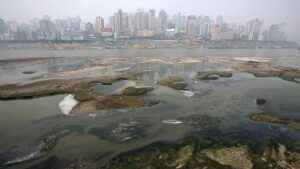Thirsty islanders rely on Fluence’s desal tech amid water shortages

The inhabitants of Mayotte - including these lemurs - face water shortages. Pic: Getty
The island of Mayotte, off the coast of Africa, is dying of thirst.
The French-controlled island has had to impose water restrictions after seasonal rains came late — but water resources were already under pressure from a rising population.
By December last year locals were reporting days going by without access to drinking water.
Enter water purifer Fluence (ASX:FLC).
Fluence — which makes low-energy, water treatment systems — has won a contract to supply three of its seawater desalination units for €1.5 million ($2.3 million). Delivery will take place within two months.
Mayotte, situated between Madagascar and the coast of Mozambique in the Indian Ocean, is an overseas outpost of France. It consists of a main island, Grande-Terre, a smaller island, Petite-Terre, and several islets.
Fluence will supply three Nirobox systems with a total capacity of 3,000 cubic metres of water a day.
Water shortages were growing in frequency around the world, Fluence’s chairman Richard Irving told Stockhead earlier this month.
“Critical water shortages more and more frequently in more and more countries, not just in the developing world,” Mr Irving said.
The global $700 billion a year water market was undergoing major change as companies and governments moved from big centralised operations — like Melbourne’s contentious desal plant — towards cheaper, cloud-based smaller units.
“Uncontrolled waste water treatment is destroying countries. The answer for all of us is decentralised treatment.”
Fluence came into existence only this year, as US water services company RWL merged with locally listed Israeli technology firm Emefcy.
Together they’re targeting both municipal and industrial water treatment around the world, from desalination in Africa to waste-to-energy in Latin America.
But in spite of reaching all of their targets and the board reiterating that they’re on track to hit their 2017 revenue target of $US90 million ($115 million), the stock itself has not yet been a hit with Australian investors.
Analysts are partly blaming Australian sharemarket investors’ lack of understanding of how important (and lucrative) water markets can be.
Fluence is going after a large share of the $13 billion global decentralised water market.
It’s also introducing the ‘as-a-service’ model to water, offering their technology as a service rather than a business or government having to front up immediately with the cash in order to buy or build a plant.
UNLOCK INSIGHTS
Discover the untold stories of emerging ASX stocks.
Daily news and expert analysis, it's free to subscribe.
By proceeding, you confirm you understand that we handle personal information in accordance with our Privacy Policy.








